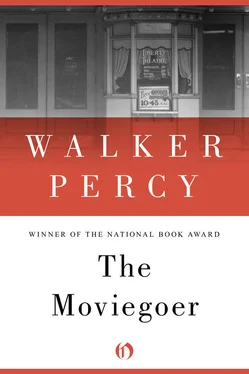Another cry and the ramoneur is gone. There is nothing for me to say.
“Don’t you love these things? Don’t you live by them?”
“No.”
“What do you love? What do you live by?”
I am silent.
“Tell me where I have failed you.”
“You haven’t.”
“What do you think is the purpose of life — to go to the movies and dally with every girl that comes along?”
“No.”
A ledger lies open on her desk, one of the old-fashioned kind with a marbled cover, in which she has always kept account of her properties, sundry service stations, Canadian mines, patents — the peculiar business accumulation of a doctor — left to her by old Dr Wills. “Well.” She closes it briskly and smiles up at me, a smile which, more than anything which has gone before, marks an ending. Smiling, she gives me her hand, head to one side, in her old party style. But it is her withholding my name that assigns me my new status. So she might have spoken to any one of a number of remotely connected persons, such as a Spring Fiesta tourist encountered by accident in her own hall.
We pass Mercer who stands respectfully against the wall. He murmurs a greeting which through an exquisite calculation expresses his affection for me and at the same time declares his allegiance to my aunt. Out of the corner of my eye, I see him hop nimbly into the dining room, full of fizzing good spirits. We find ourselves on the porch.
“I do thank you so much for coming by,” says my aunt, fingering her necklace and looking past me at the Vaudrieul house.
Kate hails me at the corner. She leans into my MG, tucking her blouse, as brisk as a stewardess.
“You’re stupid stupid stupid,” she says with a malevolent look.
“What?”
“I heard it all, you poor stupid bastard.” Then, appearing to forget herself, she drums her nails rapidly upon the windshield. “Are you going home now?”
“Yes.”
“Wait for me there.”
2
IT IS A GLOOMY day. Gentilly is swept fitfully by desire and by an east wind from the burning swamps at Chef Menteur.
Today is my thirtieth birthday and I sit on the ocean wave in the schoolyard and wait for Kate and think of nothing. Now in the thirty-first year of my dark pilgrimage on this earth and knowing less than I ever knew before, having learned only to recognize merde When I see it, having inherited no more from my father than a good nose for merde, for every species of shit that flies — my only talent — smelling merde from every quarter, living in fact in the very century of merde, the great shithouse of scientific humanism where needs are satisfied, everyone becomes an anyone, a warm and creative person, and prospers like a dung beetle, and one hundred percent of people are humanists and ninety-eight percent believe in God, and men are dead, dead, dead; and the malaise has settled like a fall-out and what people really fear is not that the bomb will fall but that the bomb will not fall — on this my thirtieth birthday, I know nothing and there is nothing to do but fall prey to desire.
Nothing remains but desire, and desire comes howling down Elysian Fields like a mistral. My search has been abandoned; it is no match for my aunt, her rightness and her despair, her despairing of me and her despairing of herself. Whenever I take leave of my aunt after one of her serious talks, I have to find a girl.
Fifty minutes of waiting for Kate on the ocean wave and I am beside myself. What has happened to her? She has spoken to my aunt and kicked me out. There is nothing to do but call Sharon at the office. The little pagoda of aluminum and glass, standing in the neutral ground of Elysian Fields at the very heart of the uproar of a public zone, is trim and pretty on the outside but evil-smelling within. Turning slowly around, I take note of the rhymes in pencil and the sad cartoons of solitary lovers; the wire thrills and stops and thrills and in the interval there comes into my ear my own breath as if my very self stood beside me and would not speak. The phone does not answer. Has she quit?
Some children have come into the playground across the street; two big boys give them a ride on the ocean wave. Ordinarily the little children ride only the merry-go-round which is set close to the ground and revolves in a fixed orbit.
I’ve got to find her, Rory. It is certain now that my aunt is right and that Kate knows it and that nothing is left but Sharon. The east wind whistles through the eaves of my pagoda and presses the glass against its fittings. I try the apartment. She is out. But Joyce is there, Joyce-in-the-window, Joyce of the naughty-you mouth and the buckskin jacket.
“This is Jack Bolling, Joyce,” says a voice from old Virginia.
“Well well.”
“Is Sharon there?”
“She is out with her mother and Stan.” Joyce’s voice has a Middle West snap. Moth-errr, she says and: we-ull we-ull. “I don’t know when shill be back.” She sounds like Pepper Young’s sister.
“Who is Stan?”
“Stan Shamoun, her fiancé.”
“Oh yes, that’s right.” What’s right? She’s not only quit. She’s marrying the macaroni. “What about you? Are you getting married?”
“What’s that?”
“I’ve been wanting to meet you for some time.”
“I just thot of something.”
“What?”
“The Lord of Misrule reigned yesterday—”
“Who?” Is she starting out on some sort of complicated Midwestern joke? Grinning like a lunatic, I hold on for dear life.
Joyce goes on talking in a roguish voice about the Lord of Misrule and a fellow down from Purdue, a dickens if she ever saw one.
The two big boys on the playground have got the ocean wave going fast enough so they can jump on and keep up speed by kicking the ground away on the low passes. Iii-oorrr iii-oorrr goes the dry socket on its pole in a faraway childish music and the children embrace the iron struts and lay back their heads to watch the whirling world.
“Joyce, I wonder if I may be frank with you”—the voice comes into my ear and I myself am silent.
“Please do. I like frank people.”
“I thought you were that kind of person—” Old confederate Marlon Brando — a reedy insinuating voice, full of winks and leers and above all pleased with itself. What a shock. On and on it goes. “—I know some folks might think it was a little unconventional but I’m gon tell you anyway. I know you don’t remember it but I saw you last Saturday—” It is too much trouble to listen.
“I remember!”
Round and round goes the ocean wave screeching out its Petrouchka music iii-oorrr iii-oorrr and now belling out so far that the inner bumper catches the pole and slings around in a spurt so outrageously past all outrage that the children embrace the iron struts for dear life.
“I’m only home for lunch,” says Joyce. “But why don’t you come over Saturday night. Some of the kids will be there. Praps we could all go to Pat O’Brien’s.” Joyce makes herself out to be a big girl child, one of the kids, and all set for high jinks.
“No praps about it.”
A watery sunlight breaks through the smoke of the Chef and turns the sky yellow. Elysian Fields glistens like a vat of sulfur; the playground looks as if it alone had survived the end of the world. At last I spy Kate; her stiff little Plymouth comes nosing into my bus stop. There she sits like a bomber pilot, resting on her wheel and looking sideways at the children and not seeing, and she could be I myself, sooty eyed and nowhere.
Is it possible that — For a long time I have secretly hoped for the end of the world and believed with Kate and my aunt and Sam Yerger and many other people that only after the end could the few who survive creep out of their holes and discover themselves to be themselves and live as merrily as children among the viny ruins. Is it possible that — it is not too late?
Читать дальше












